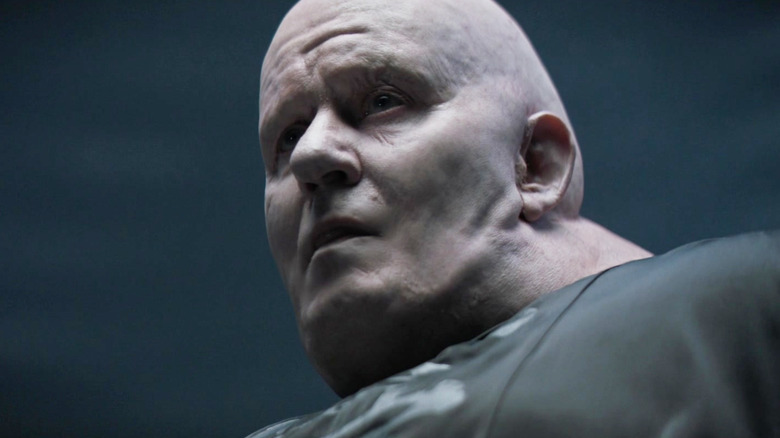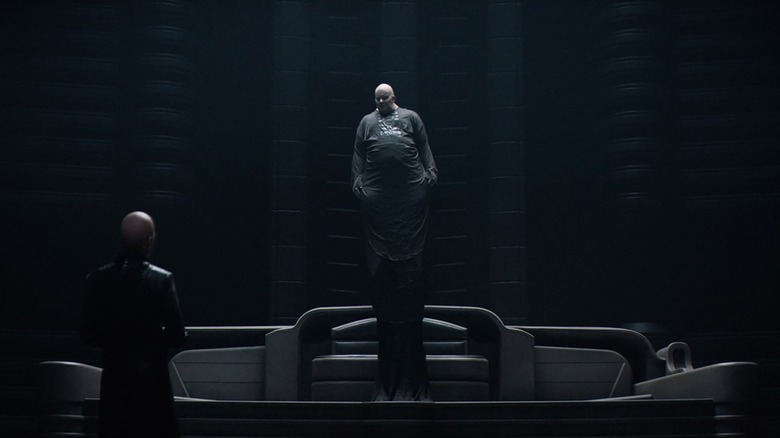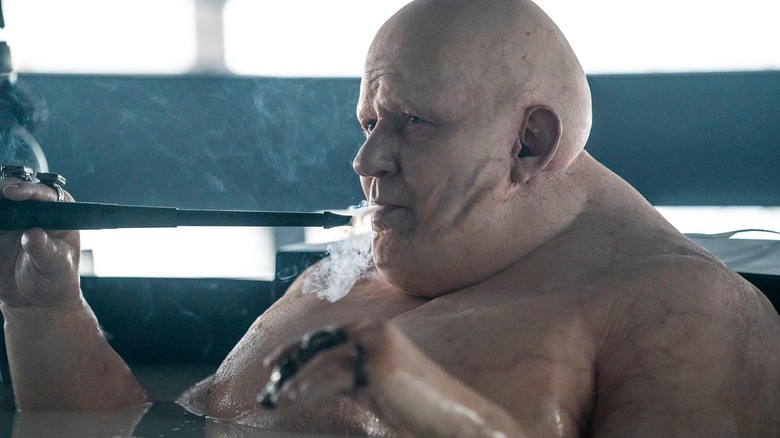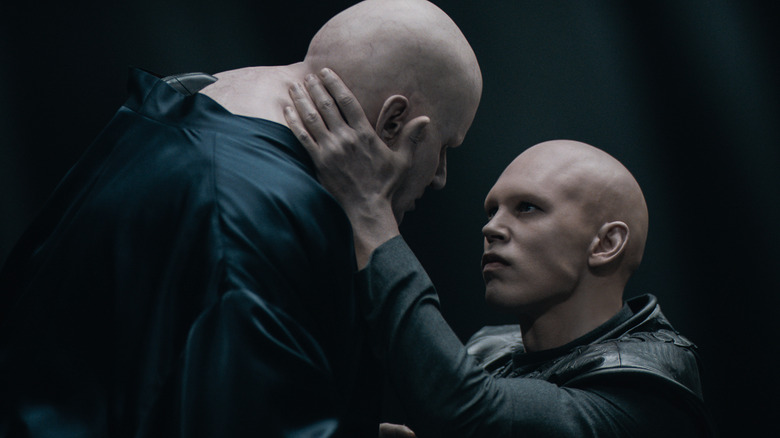Who Is The Main Dune Villain? Vladimir Harkonnen Explained
Against all odds, audiences have been introduced to Frank Herbert's groundbreaking — though utterly complex — sci-fi novel thanks to not just one but two widely well-received "Dune" adaptations from director Denis Villeneuve. (Though that's not to say that David Lynch's 1984 film is without its own set of defenders.) After "Part Two" rode multiple sandworms to the top of the box office, the moviegoing public at large is now familiar with the absolute geekiest of concepts: the eugenics-obsessed order of Bene Gesserit space witches, Paul Atreides' foreknowledge of the future, and, of course, the meme-friendly mystique surrounding the Lisan al Gaib.
But as much as "Dune: Part Two" earned praise among critics and fans alike, newcomers to the franchise may have come away from the sequel surprised by the relative lack of screen time for the first film's most startling element of all: Stellan Skarsgård's villainous Baron Vladimir Harkonnen. His outsized presence in "Dune" likely led many to believe that he would rise to even greater prominence in the second movie, further fleshing out the antagonist's backstory, motivation, and other extraneous bits of lore that were only ever hinted at the first time around. With so many otherworldly concepts to introduce and an ever-expanding list of characters to juggle, however, the head of House Harkonnen once again had to settle for making the absolute most out of a minimal role.
It'd be a little odd to say that the monstrous Baron left us "wanting more," but the enigmatic figure behind the events of "Dune" undoubtedly inspired a wealth of questions: who he is, what he had against the Atreides clan, what exactly his plan was with the Emperor, how his portrayal in the films differs from the book, and much more.
Major spoilers for "Dune: Part Two" ahead.
His desert, his Dune, his Arrakis
Unlike the first movie, "Dune: Part Two" spends much more time dealing with the political machinations between the Baron and the Padishah Emperor (Christopher Walken), both of whom temporarily join forces in order to bring the rapidly-rising House Atreides to its knees. It's clear that the removal of the Harkonnens from Arrakis and the installation of the Atreides in their place is done at the Emperor's behest — and that the Atreides are well aware of the dangers, even as they follow these orders into the harshest and most unforgiving of environments.
In the novel, it's made immediately apparent that the Baron is acting to take advantage of a once-in-a-lifetime opportunity. Not only does staging a coup against the Atreides represent a major power grab for the Harkonnens to eventually seize the Emperor's throne, but it also provides a means to settle a long-held grudge against their hated rivals. Herbert alludes to the fact that this stems from an ancient battle in which a Harkonnen soldier was banished by an Atreides officer for the sin of cowardice, inspiring a wave of hatred against the Atreides clan that has been passed down from generation to generation. In another aspect the films leave out, the Baron spends far more time monologuing about his villainous plots and reflecting on his inner thoughts in the book. Villeneuve chose to do away with this entirely for his adaptations, instead relying on the nuances of Skarsgård's performance. (According to the actor, this was taken to such an extreme that he admitted to reading his dialogue in the script and that, initially, "My first reaction was, 'This is not much.'")
Still, fans could rest assured that this approach did little to lessen the Baron's impact on the story at large.
The Baron (and his changes) explained
By the time the events of "Dune" begin, the brutal Harkonnens have spent decades oppressing and exploiting the indigenous Fremen of Arrakis for their wealth of spice. Though the face of their persecution initially comes in the form of Beast Rabban (Dave Bautista), his uncle Vladimir remains the true figurehead behind their suffering.
In one of Herbert's more unfortunately dated tropes, the book reflects the Baron's greed and hunger for power through his disturbing desire for young boys, particularly his own nephew Feyd-Rautha, played by Austin Butler (which, aside from one improvised moment, is wisely done away with in the films). At the same time, his own physique further hints at the same thematic idea (which is problematic in a different way). He's memorably introduced in the second chapter of the original novel while literally kept in the shadows, described as "grossly and immensely fat" and requiring the need of gravity-defying "portable suspensors harnessed to his flesh" to help keep the weight off his feet. Though his general description is maintained faithfully, Villeneuve reimagines this particular aspect to have the Baron levitate and hover over those around him — a much more visually dynamic way of highlighting his power and influence. In another slight deviation from the novel, this is also what saves his life when Duke Leto (Oscar Isaac) uses his last gasp to unleash a poison gas cloud on his enemies in the climax of the first "Dune."
Both before and after the overthrow of House Atreides, Baron Harkonnen rules with an iron fist and a duplicitousness rivaled only by his own obsession with preserving the Harkonnen line. "Part Two" ups the ante when he installs the even more conniving Feyd-Rautha to exploit the planet ... but this also precipitates his own downfall.
End of the line
Despite a significantly pared-down role in "Part Two," the Baron certainly makes his presence felt. His primary purpose in the sequel is to let Feyd-Rautha off his leash and hunt down the remaining survivors of House Atreides. With the mythical Muad'Dib remaining just out of reach and stirring up the Fremen in violent rebellion, the Baron gives his blessing for a scorched-earth policy that finally forces Paul (Timothée Chalamet) out of hiding and convinces him to take a drastic measure: partaking in the dangerous Water of Life ritual. Little could the Baron know that this would signal the beginning of the end for both him and the Harkonnens overall.
It's a fitting development that the Baron's own cruelty and lust for power results in his ultimate fate. Once Paul and the Fremen launch an attack on the Emperor's forces, who arrive on Arrakis in response to Paul's challenge to the throne, nothing can stop the violence that erupts when our protagonist plunges a knife into the Baron and kills him in cold blood. (A time jump in the novel allows for Paul's young sister Alia, played by Anya Taylor-Joy in a cameo, to be the one responsible for killing the Baron.) When Beast Rabban is subsequently killed by a vengeful Gurney Halleck (Josh Brolin), all hope for the continuation of the Baron's lineage lies with Feyd-Rautha ... but he, too, is killed in his duel with Paul. It's only an ironic twist of fate that, as a result of Lady Jessica's (Rebecca Ferguson) ancestry as the illegitimate daughter of the Baron, Paul's ascendancy ensures a Harkonnen will sit on the throne – just not how the Baron expected.
With the Baron out of the picture, Paul's story can be completed in a potential "Dune 3."



